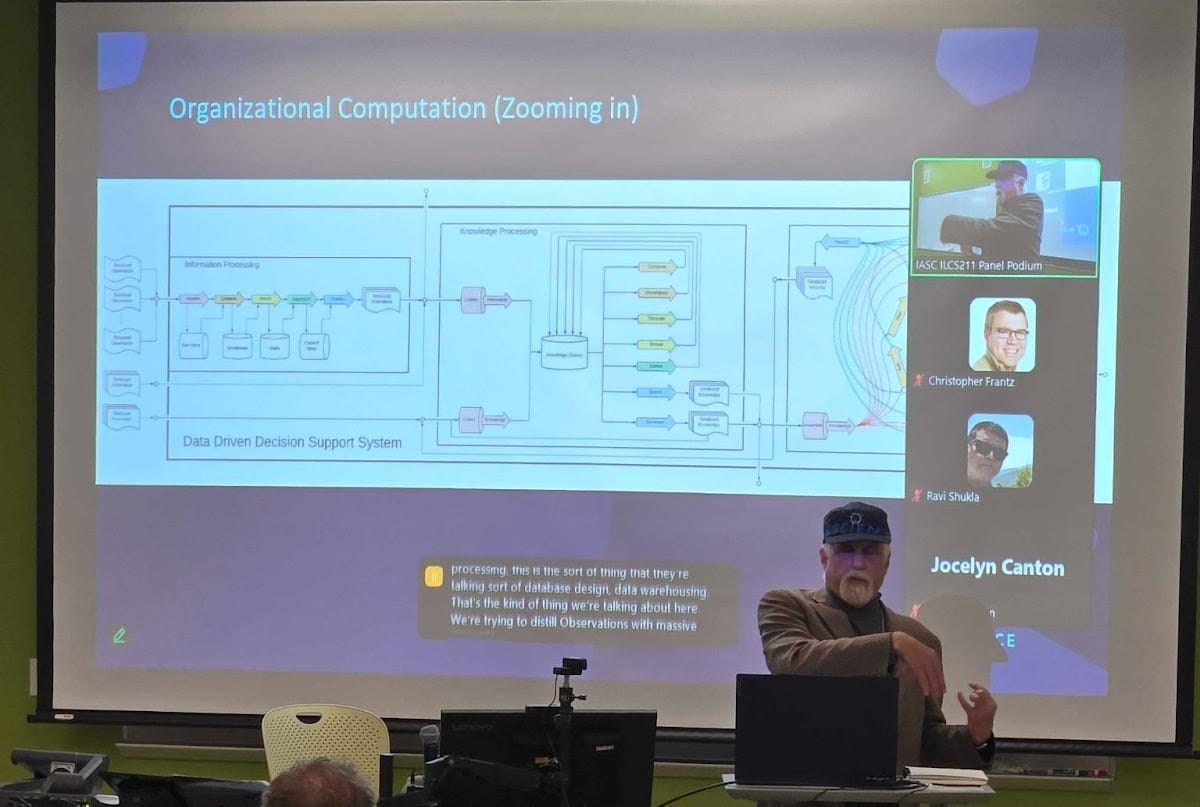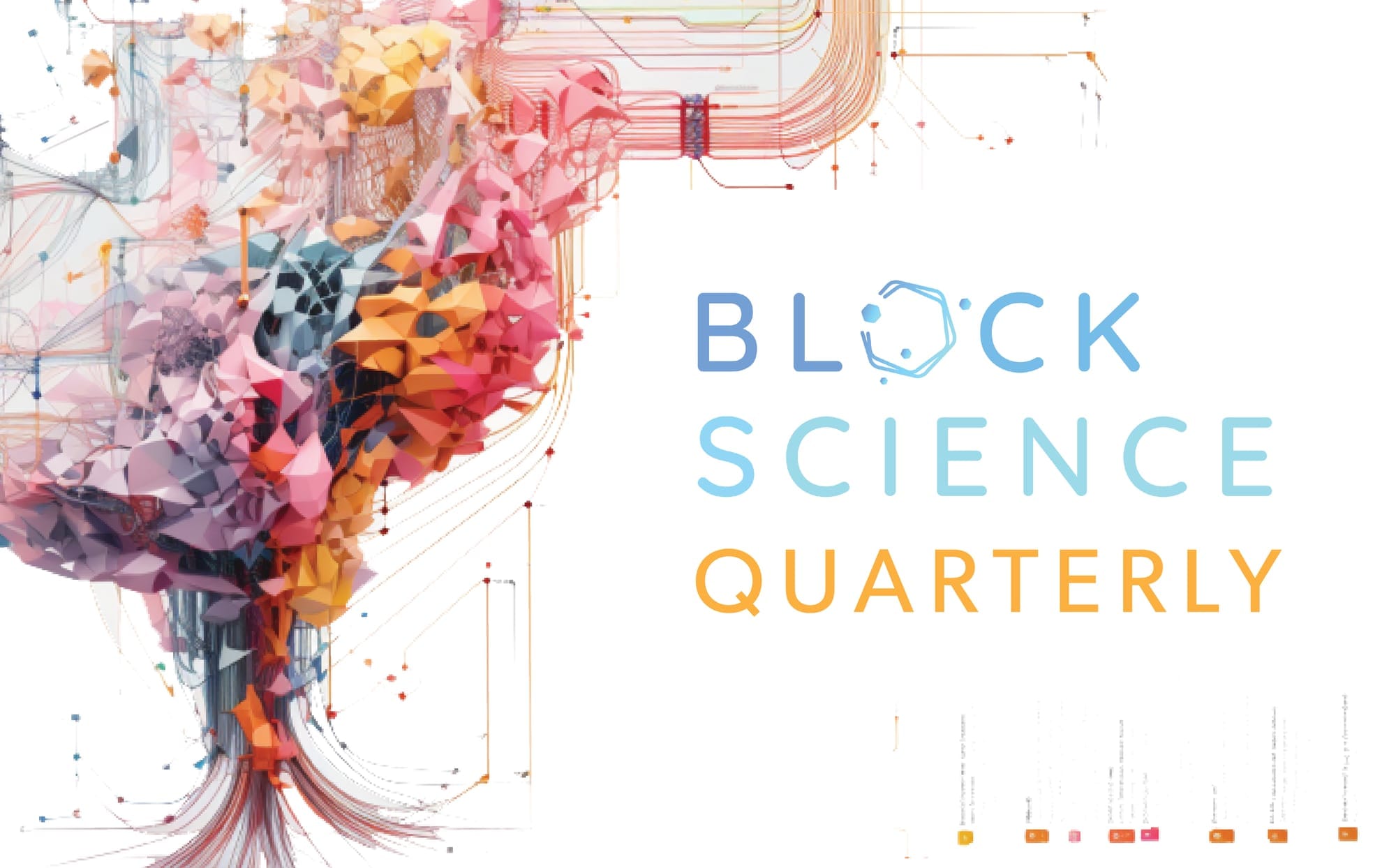Summer is heating up but we’re staying cool as 🥒🍧🧊🍦
Contributing across disciplines, from systems design and institutional complexity to adaptive interfaces and commons stewardship, our team continues to focus on grounding emerging technologies in sound engineering and thoughtful governance.
We’ve shared our work and ideas at events like the International Association for the Study of the Commons (IASC), Collaborative Finance Gathering, Cascadia Bioregional Finance Conference, as well as through collaborative experiments like “Folk Canvas.” These conversations have deepened our commitment to building shared infrastructure that respects complexity, centers human agency, and fosters long-term resilience.
In this issue you’ll find:
- Updates from our research network
- Featured publications
- Glimpses into the frameworks that shape our practice
Join us as we take to the road!🚌From events on both US coasts to Europe, and a university visit in China, we’re excited to share what we’re learning along the way…
A Systems Engineering Perspective on Artificial Intelligence (AI) Agents
What does it mean to call an AI system an "agent"? In this piece based on The AI Fundamentalists podcast, Dr. Michael Zargham grounds the concept of AI agents in systems engineering. Drawing on real-world experience and engineering principles, he explores how autonomy, accountability, and human oversight shape responsible AI deployment—reminding us that every agent operates on behalf of someone.
🎧 Listen to the full conversation on The AI Fundamentalists podcast:
- Principles, Agents, and the Chain of Accountability in AI Systems – Examines how responsibility is distributed across AI agents and their creators.
- Mechanism Design: Building Smarter AI Agents (Part 1) – Introduces foundational principles for engineering intelligent agent systems.
- Utility Functions and Smarter AI Agents (Part 2) – Continues the conversation with a deeper dive into goal alignment and design tradeoffs.
KOI Nodes as Neurons
How do knowledge networks process information? In this research share, Senior Research Engineer David Sisson explores Knowledge Organization Infrastructure (KOI) nodes through a computational neuroscience lens, drawing parallels to neurons and reflexes to examine digital sensation, perception, and metacognition. The result is a systems-level look at how KOI enables adaptive, collective intelligence in complex environments.
A Preview of the KOI-net Protocol
This post offers an early look at KOI-Net, a protocol designed to support scalable and accountable knowledge systems. By aligning knowledge graph architecture with engineering principles, KOI-Net aims to formalize how we structure, validate, and evolve shared information across digital ecosystems.
Understanding Large-Language Models
LLMs are not oracles. They are tools. This post explores how large language models function as interfaces within broader systems, not as autonomous agents. Drawing from systems engineering, cognitive science, and control theory, it clarifies common misconceptions and emphasizes the importance of human responsibility, clear framing, and practical limits. It also highlights the risks of overtrusting metrics and encourages thoughtful design grounded in real-world context and accountability.
Interface Experiments from Project Interlay
Project Interlay builds on foundational KOI Network research, extending it into interface design for systems that adapt to unknown or evolving data structures. Blockscience fellow Orion Reed shares a proof-of-concept from the “Folk JS” collaboration with Chris Shank, showcasing spatial canvases and scoped propagators as tools for more flexible, modular software. Watch the demo video or explore the code on GitHub.
🛣️ BlockScience on the road…
International Association for the Study of the Commons, University of Massachusetts Amherst
Multiple members of the BlockScience team participated in the 2025 International Association for the Study of the Commons (IASC) Conference, contributing to critical conversations around digital infrastructure and commons governance.
- Model-Based Institutional Development: Session 1
- Amber Case, RJ Cordes, and Michael Zargham participated in a panel focused on institutional design through computational methods. They discussed using institutional statements for navigating complex organizations. As part of the broader theme on Methodological Approaches and Computational Institutional Science, the session explored how Model Based Systems Engineering (MBSE) can inform the design of accountable, stakeholder-aligned governance systems.
- Model-Based Institutional Development: Session 2
- In a continuation of the conversation, Michael Zargham chaired a panel with Seth Frey, Christopher Frantz, David Sisson, and Ravi Shukla. Their talks examined simulation and modeling approaches for institutional analysis using MBSE principles. This session was also part of the broader theme on Methodological Approaches and Computational Institutional Science.

- Modeling Knowledge Commons Across Contexts: Session 3
- David Sisson presented on how knowledge commons can support informed decision-making within and across organizational boundaries. Referencing Why is there Data? and Data Intermediary Networks, his talk explored how data, information, and understanding function as part of operational supply chains. He highlighted how interoperability and co-regulation across independently governed organizations reflect the polycentric nature of digital knowledge systems.
- Designing & Stewarding Federated Bioregional Knowledge Commons: Session 4
- Jessica Zartler participated in a session focused on designing digital infrastructure for place-based coordination; Designing & Stewarding Federated Bioregional Knowledge Commons. The session was led by Bill Baue, Senior Director of R3, a non-profit promoting Redesign for Resilience and Regeneration and Rodger Mattlage of Sociocracy for All. Drawing from systems thinking and institutional analysis, the panel emphasized how ontological pluralism and knowledge sovereignty can support federated models of governance across bioregions. Part of the broader theme on Methodological Approaches and Computational Institutional Science, the session highlighted strategies for enabling regenerative collaboration through shared knowledge systems. Check out the session slides here.
Handbook on Institutions and Complexity
Senior Researcher Eric Alston co-edited the Handbook on Institutions and Complexity, a new volume exploring how complexity theory can inform the design, evolution, and resilience of institutions. With contributions from a global network of scholars, the book introduces key ideas like emergence, non-ergodicity, coevolution, and Knightian uncertainty to better understand how institutional systems form and adapt.
In a short video introduction, Eric outlines the book’s motivations, emphasizing the importance of humility and flexibility in institutional design under uncertainty. This research supports BlockScience’s broader mission to advance systems engineering and governance frameworks for dynamic, real-world environments. He also expands on these ideas in a longer talk, examining how communities coordinate at scale and adapt over time.
Watch the intro videoRead more at Elgar Publishing
Presentation at New York University Shanghai, China
A KOI Perspective
In April, Research Engineer Luke Miller presented Knowledge Organization Infrastructure (KOI) to students at NYU Shanghai in Professor Helena Rong’s course on Web3 and institutional design. He opened with a metaphor: today’s internet resembles a patchwork of private castles, where platforms lock away knowledge behind walls. KOI offers a different path —community-governed infrastructure where contributors retain control over their data. The session introduced students to ideas around transparency, autonomy, and resilience in digital knowledge systems.
Cascadia Bioregional Finance Conference, Seattle
“Bioregional Finance seeks to shift global and extractive systems toward local, long-term, sustainable initiatives that restore ecosystems and promote community well-being. By leveraging localized knowledge and resources, bioregional financing aims to build resilient economies that are in harmony with the unique needs of each bioregion.”
-From cascadiabiofi.org/
How do we regenerate an entire watershed? How do we regenerate an entire bioregion? These were questions posed by Cascadia BioFi at the first annual conference in Seattle in May. The event gathered leaders in systems change and grassroots activism from the Cascadia Bioregion and beyond to share knowledge and collaborate on action in environmental regeneration, affordable housing, indigenous sovereignty, rights of nature, new economic models, participatory governance, art, and technology.
BlockScience’s Jessica Zartler, a Cascadian resident and advisor for the BioFi Project, attended and moderated a panel on new economic models for environmental regeneration. The event was held at the historic Georgetown Steam Plant, a 119-year-old decommissioned energy plant now hosting events - apropos for discussions on new public infrastructure encapsulating both solar punk and literal steam punk! Conference attendees were also graciously welcomed at the Duwamish longhouse for dinner and storytelling. The Duwamish (dxʷdəwʔabš) are the host tribe of Seattle and allies of Regenerate Cascadia leading many efforts in bioregional stewardship and regeneration.
“The name ‘Seattle’ is an Anglicization of Si'ahl (1780-1866), the most famous dxʷdəwʔabš chief and venerable leader known for his peaceful ways and protection of early immigrants.” (DuwamishTribe.org)
Collaborative Finance Gathering, Austria
Exploring Mycofi
Jeff Emmett and Scott Morris presented new work on MycoFi at the recent Collaborative Finance Gathering (CoFi 3) at the Commons Hub in Austria. MycoFi explores sufficiency economics and collective resource flow, drawing inspiration from mycelial networks to help communities fund shared needs in resilient and regenerative ways.
CoFi 3 brought together a diverse group of participants to deepen connections and advance alternative financial systems, including mutual credit, mesh credit, and local vouchers. Through a balance of structured sessions, open discussions, and community activities, the event created fertile ground for participants to exchange ideas, strengthen collaborative projects, and imagine new economic possibilities guided by principles of trust and interdependence.
🙏 Thank you for walking with us on our mission. From sharing knowledge to building local and global relationships, this quarter has been a reminder that meaningful systems are shaped not just by what we create, but who we create with. 🤝🫂
We’re grateful to be in conversation with so many thoughtful collaborators, friends, and curious minds. If something here sparked interest or you’d like to explore a connection, feel free to reach out at info@block.science.
From our team to yours… enjoy the warmth and energy of summer! ☀️🌻


